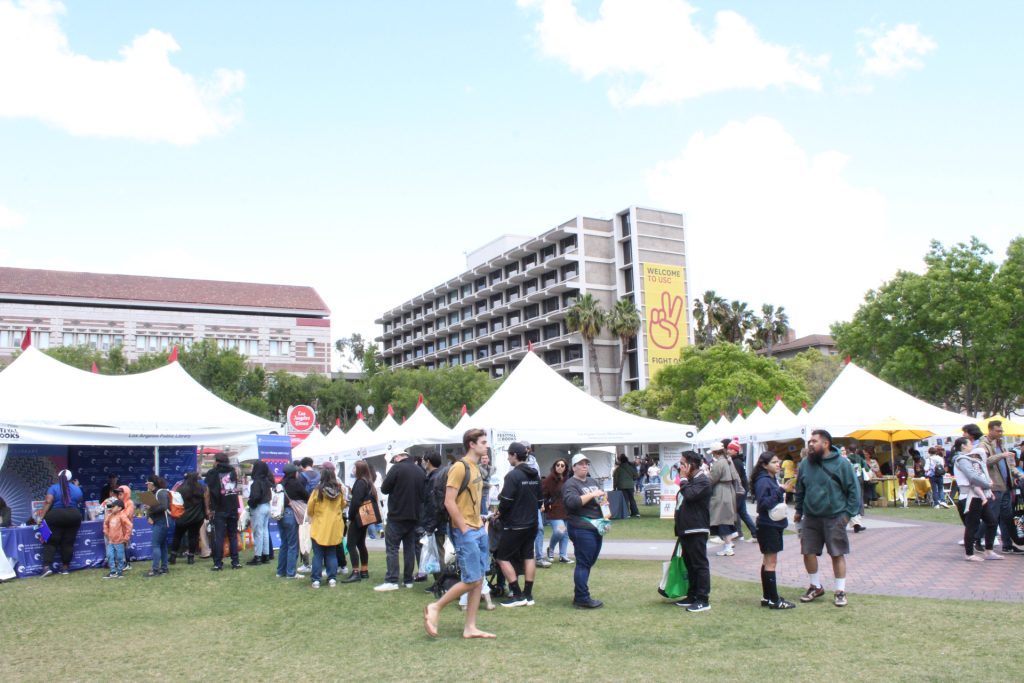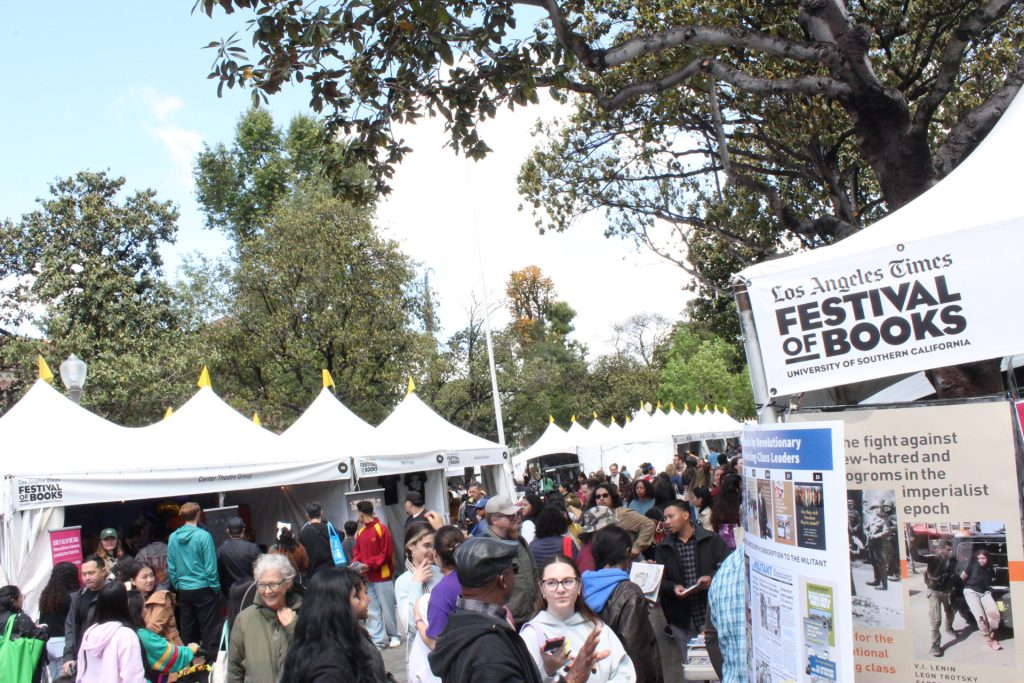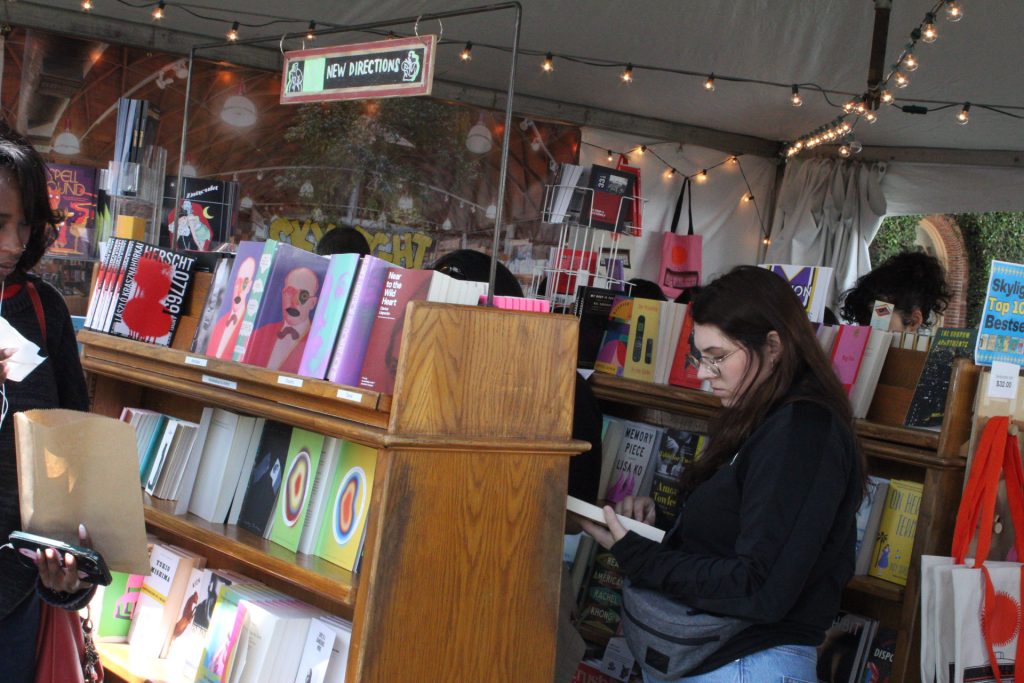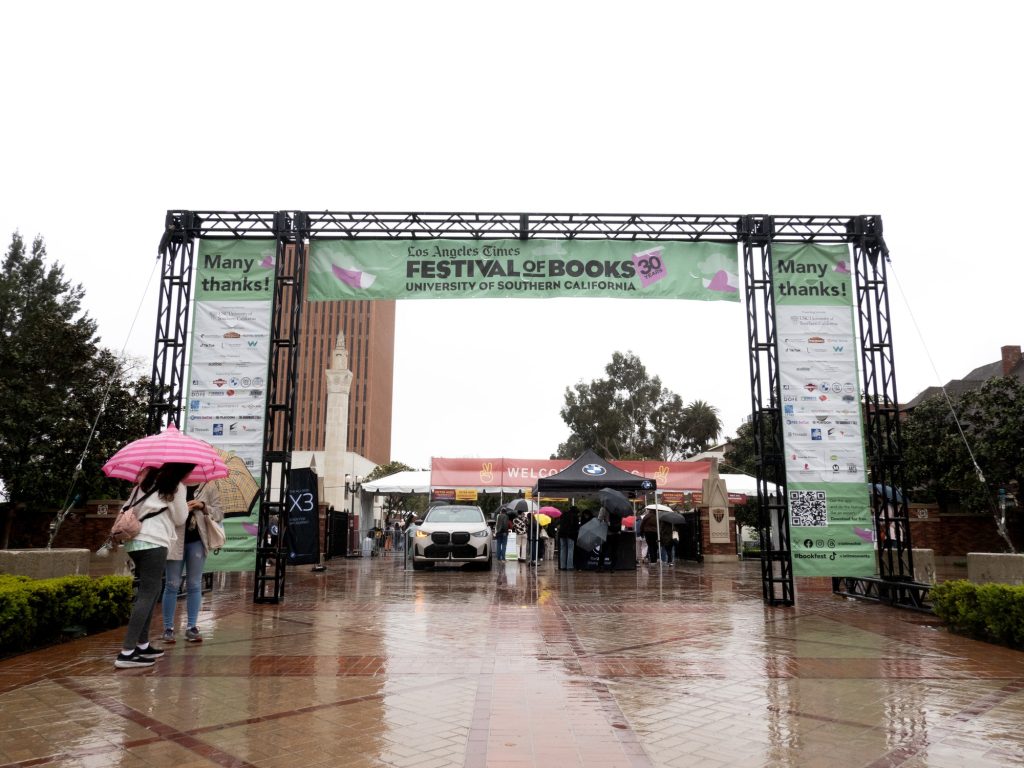
For the 30th year in a row, the avid readers of Los Angeles convened to attend the world’s largest book convention, the LA Times Festival of Books. Drawing an estimated crowd of 150,000+ to the USC campus, the Festival and its more than 200 organized events can be considered a magnet to the world of literature, and more broadly, culture. Join us as we take you through the Festival to short stories by Amor Towles, standouts in audio storytelling, the latest from Hollywood reporters, the latest in romance writing, paradise by Pico Iyer, fantasy from Rebecca Yarros and behind the scenes looks from Kristen Kish and Tom Colicchio of Top Chef.

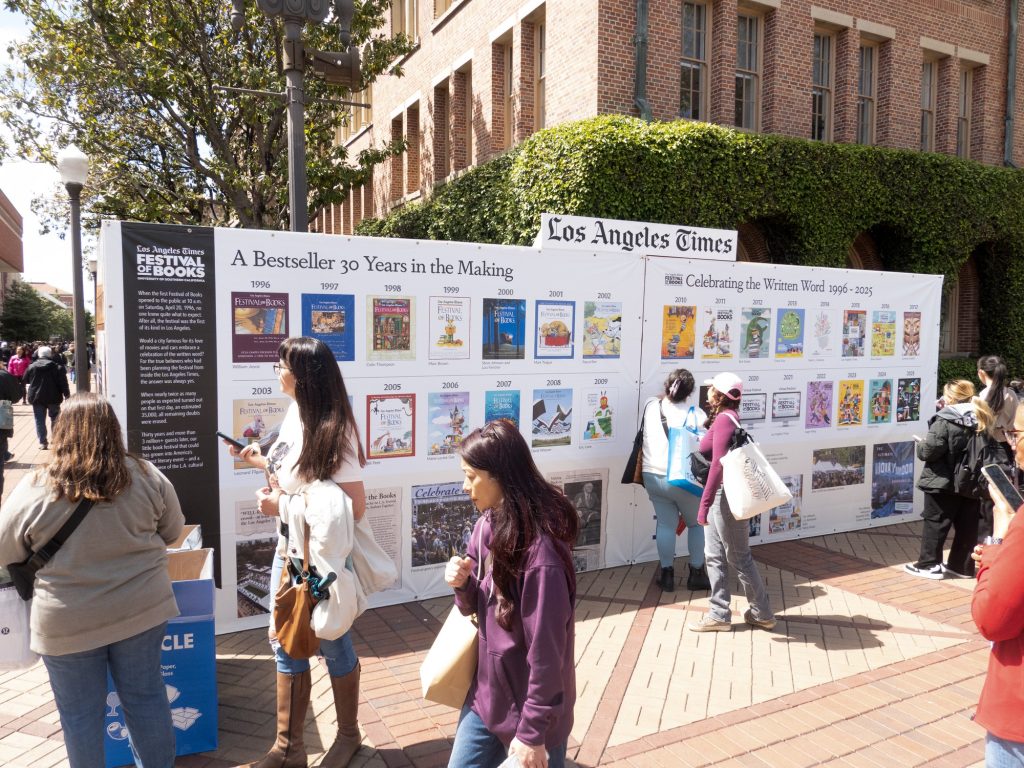

Amor Towles, author of “Table for Two,” in conversation with Donna Wares
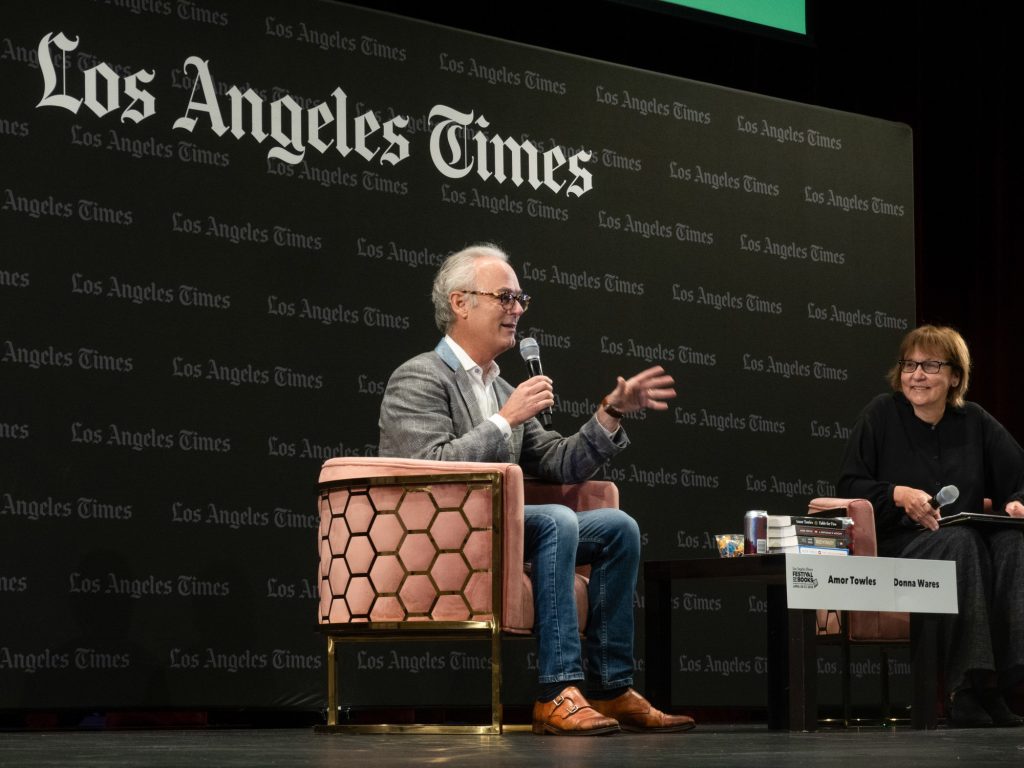
Towles would not consider himself a historical writer. Though history takes what seems like an overwhelming presence through almost all his works, Towles explores the past’s grand narratives with the human drama always front and center, playing carefully with perspective to reveal depths and excitement in his stories that ultimately rewards the reader with a shard of what must be universal human experience. Speaking at the Festival of the Books on opening day, Towles dove into his life as a writer and his own historical steps that have led him to his most recent publication, “Table for Two.”
Towles shared how his passion for writing began short and small in the form of short stories written when he was in the first grade and remained with him through high school and graduate schools. Yet for the longest while nothing came of it and, like his father before him, Towles decided on a career in investment banking. Partially due to his father’s anxieties over the desperate fate of many writers, Towles found himself sidelined from the blank page for nearly ten years. But the other anxiety always remained: the fear that he had forsaken his childhood self. So, he spent the next seven years as a weekend novelist, slowly tinkering at his novel, only to look at his work seven years later and not like it. “If you spend seven years on a work of art,” he chuckled to the Bovard Auditorium crowd, “and you don’t like it at the end – you should reflect on that.”
And so he did. From then on, Towles dedicated his time towards experimenting to find a style of writing that worked for him. “Bad ideas travel at the speed of light,” he admitted to the crowd, but sometimes, he said, the idea for his novels came to him as a “simple conceit or a sentence.” (The plot for “A Gentleman in Moscow” started with asking “what if a guy gets trapped in a hotel for a long period of time?”) Towles would take these seeds of an idea and begin to develop them, sometimes for two to three years at a time. Filling notebook after notebook with thoughts about structure, about characters, about twists and dialogues, Towles would begin to build his sensibility for the world he would soon immerse into with the essentials in mind (the who’s, the where’s, the what’s and why’s) he would start to “tell the story to himself from different angles,” leading him to his definitive style that’s on full display in “Table for Two”, a series of short stories and a novella that picks up on a certain beloved diva’s journey after the conclusion of “Rules of Civility.”
Each story in “Table for Two,” Towles shares, moves further and further from the absolute certainty of the first person, progressing from the first short’s total omniscience to the eight different perspectives that tell the final novella. These stories derive their drama from their competing perspectives, Towles explained – their assumptions, bickering, sudden friendships and suspicions are all fed by their challenge to any kind of absolute truth. Through these voices, set in a mix of contemporary and historical settings, the world emerges. Whether the story is set today or against a historical backdrop does not matter to Towles. What matters is that these voices ring true, that any of us could relate to a character conjured on the blank page, that yesterday’s world reproduced can give us “a glimpse into the human self that is timeless and priceless.”
Standouts in Audio: A Conversation with the Audiobook Award Finalists
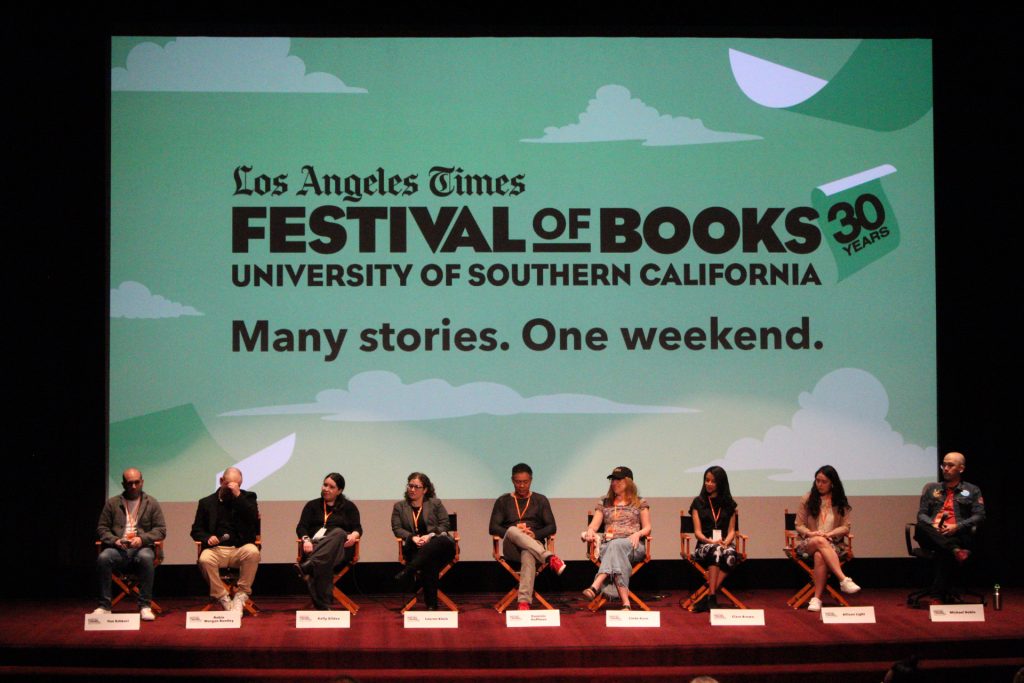
Just a day before the start of the 30th Annual LA Times Festival of Books, the LA Times announced their winners of the 45th Annual Book Prizes. Among them was an award for Achievement in Audiobook Production (presented by Audible), given to Dominic Hoffman as the narrator and Linda Korn as the producer of “James: A Novel,” by Random House Audio.
Hoffman and Korn were joined by their fellow nominees the next morning at the panel held at the Norris Cinema Theatre at USC. To the right of Hoffman and Korn were the people behind the audiobook for classics “1984” by George Orwell and “Giovanni’s Room” by James Baldwin. The “1984” duo consisted of composer Ilan Eshkeri and producer Robin Morgan-Bentley. “Giovanni’s Room” was represented by co-producers Kelly Gildea and Lauren Klein. On the other end of the panel was Clare Brown and Allison Light, involved in the production of the original audiobook “New Nigeria County.” The final panelist was Michele Norris, producer of “Our Hidden Conversations.”
Lead of the Audible content consumer team Diana Dapito assumed the role of facilitator for this panel, kicking things off by acknowledging the winners of the Book Prize and Eshkeri’s work on “Ghost of Sashimi” not “Ghost of Tsushima.”
Morgan-Bentley, who worked with Eshkeri on “1984,” expressed the feeling of “massive responsibility” in staying faithful to the story but also finding fresh perspectives that justified the need to make a new adaptation. These fresh perspectives manifested in what Morgan-Bentley called “new blood,” compiling a mix of up and coming people with different backgrounds to work on the project. Eshkeri said he approached the score like he would a Hollywood movie, and the soundtrack was recorded the same place the “Star Wars” score was recorded, Abbey Road.
Gildea expressed similar thoughts about their adaptation of “Giovanni’s Room,” stating that the team felt “such responsibility to tell the story as authentically as we can.” Gildea’s co-producer, Klein, described it as a “balancing act.” Both had high praise for Matt Bomer, actor and the narrator for the audiobook, who they said was a natural storyteller.
“New Nigeria County” sets itself apart from the others as a satire that evolved from the TikTok of Brown to a full fledged audiobook production. Brown spoke on the difficulty of going from a one-woman show on TikTok to slowing down and building out the world for the audiobook. As the producer, Light’s biggest priority was to bring a cast together in person where they could capture the comedic timing, chemistry and “kinetic” energy needed to gain the likes of both TikTok fans and new audiences.
Michael Noble started his segment with a broken microphone (leading to Dapito cuing for an audio joke) and a cough drop to salivate before talking about his project “Our Hidden Conversations” with Norris’ The Race Card Project. Noble took the six word stories detailing experiences with race and turned it into an audiobook with a very large cast of personal narrators, some even being friends and family when he needed to “fill the gaps.” One of these gaps was filled by his mom’s 70 year old friend from Philadelphia, who was casted so one of the stories can have an authentic Philly accent.
The panel looks forward to the continued growth of the audiobook’s popularity. Brown says the audiobook continues to get more and more immersive, as if one were “listening to a work of art.”
Ask a Reporter: Is Hollywood Poised for a Comeback?
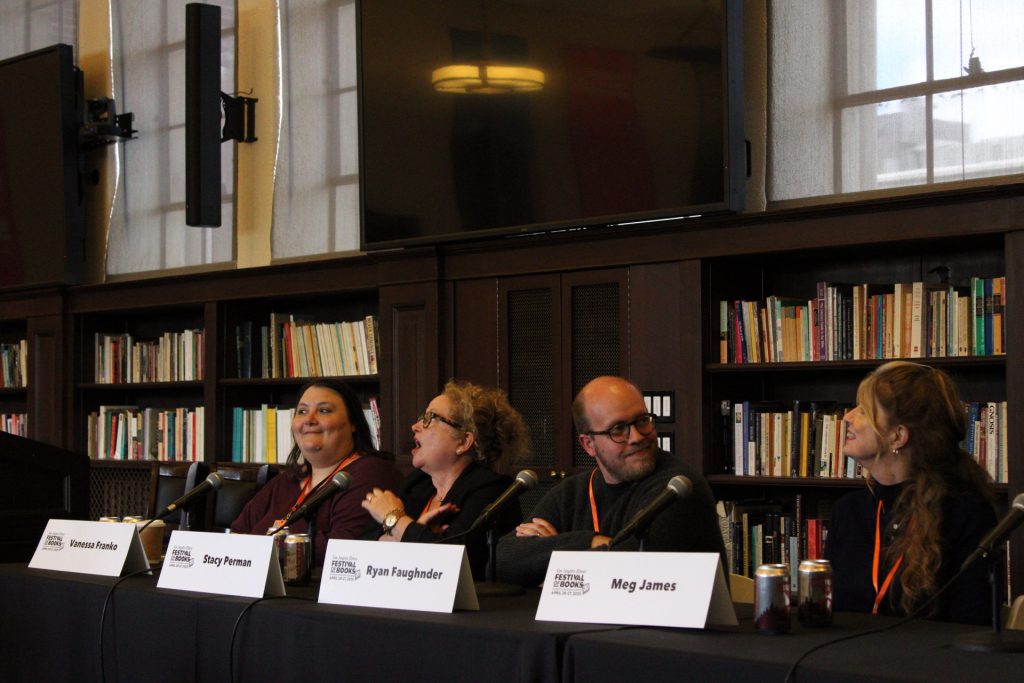
Slotted into the quaint library of Mudd Hall’s second floor, a selection of The Los Angeles Times entertainment writers and editors gathered to discuss the question, “Is Hollywood Poised for a Comeback?” On the esteemed panel was Meg James, Ryan Faughnder and Stacy Perman, all of who were in conversation with the presentations host and Senior Audience Editor at the LA Times, Vanessa Franko. With the fate of Hollywood hanging on these reporter’s every word, the questions commenced.
To kick off the session with the face-masked elephant in the room, Franko asked for the panels take on if the entertainment industry has regained normalcy after COVID. James was quick to say no, pointing to the one-two-punch of the pandemic shut down in 2020 being abruptly followed by the industry-wide strikes in 2023. She then said that the major studios are in an “OS” moment before Faughnder cut in with calling it an “SOS” moment to keep this discussion’s rating PG.
Ryan goes on to discuss how overall revenue across the industry has been in decline since “a la carte” streaming is nowhere near as profitable as cable television and jokingly remarked how movie theaters shocked AMC’s Nicole Kidman add didn’t have people rushing back to pay $25 a ticket to watch “Snow White.”
Another topic of conversation was the government’s role in helping fund this enterprise. While Gavin Newsom has raised tax credits for filing in California, Perman noted that it is not enough to keep this state competitive on a global scale. She noted now major film production has moved away from the golden coast and into more tax-friendly states such as New Mexico and Georgia. Furthermore, on a federal level, Perman is doubtful that Donald Trump’s Hollywood ambassadors will actually promote growth within the industry – adding that Trump only cares about Hollywood because he wants to be put back into the TV version of “Home Alone 2: Lost In New York.”
More on this issue, James pointed out how some people would rather see tax revenue go towards civil projects and education rather than fund an industry of billionaires – a common misconception about an industry built upon the talent of blue collar workers. Even though the movie business is a clean investment that drives the economy, she begged the question of Hollywood’s legitimacy as an industry if it depends upon government money to survive.
When Franco asked about the future of Hollywood, the guests had many disconcerting views as to its continued decline. On the usage of AI, while they all agreed it has pros and cons, one of the pros, in Faughnder’s opinion being meme creation, James added that its employment comes at the cost of human jobs.
In light of union struggles to meet proper agreements with studios, Perman addressed how major production elements, such as VFX, have already been outsourced to other, cheaper, countries. As for the studios themselves, James predicted that many of them will have to consolidate, leaving only Disney, Netflix and Amazon left standing.
To cap this discussion off on the namesake of the panel, with all the detrimental factors previously discussed, all James, Perman and Faughnder agreed that, while Hollywood will survive, the industry will never be the same.
The Best Kind of Hell: Relationships in Contemporary Fiction
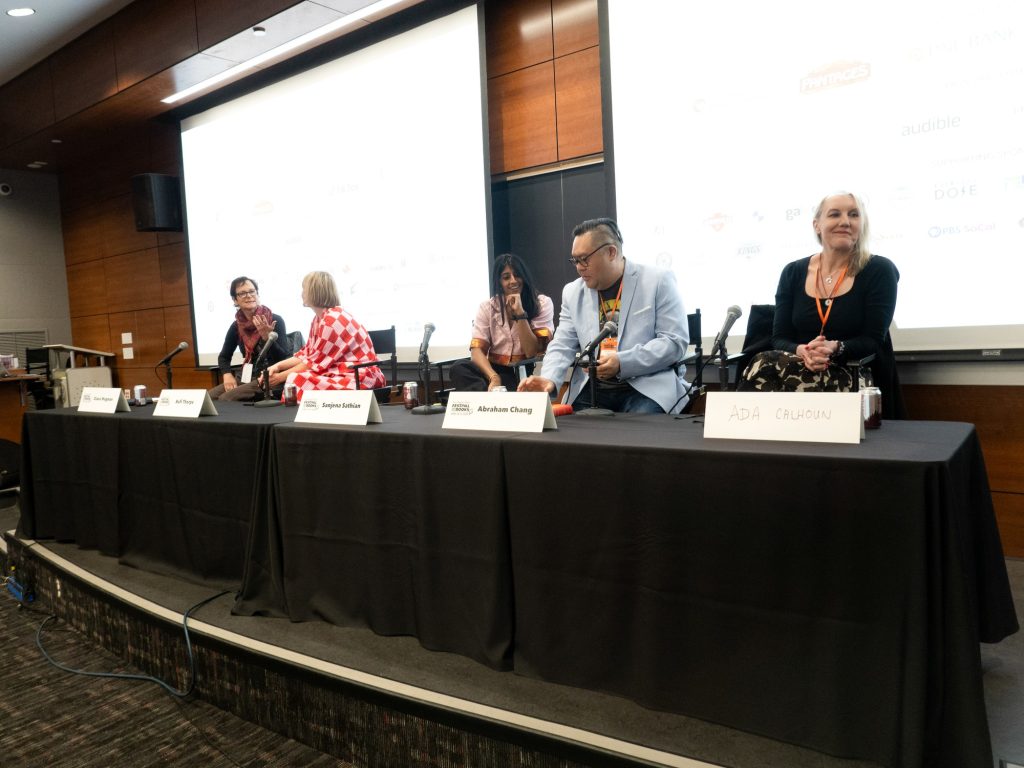
Moderator Diana Wagman opened “The Best Kind of Hell: Relationships in Contemporary Fiction” panel by asking, quite appropriately, why hell? What does the title of the panel even mean?
After a chuckle from the crowd, Wagman descended into “Dante’s Inferno,” where each ring of Hell belonged to a different group. According to Wagman, “there should be a special ring for families.” Thus, the panel showcased Rufi Thorpe, Sanjena Sathian, Abraham Chang and Ada Calhoun—all authors whose work focused on the complex journey of finding the self while juggling the burdens of family and expectations.
A majority of the panel focused on balancing what is fictional and what is personal in a contemporary novel. Sathian, author of “Goddess Complex,” talked about how she was able to parcel out certain aspects of herself into multiple characters. A significant element of Sathian’s novel is the play on her real name to muddy the waters between fact and fiction within the story. Chang, author of “888 Love and the Divine Burden of Numbers,” described his book as a form of “wish fulfillment,” allowing his novel’s protagonist to make decisions and experience things that he wished he could’ve as he was growing up. Calhoun, author of “Crush,” is perhaps the most familiar with the blurry line between fiction and reality in a novel—before turning to fiction (which many claim can be defined better as a “fantasy memoir”), Calhoun ghost wrote 30 successful celebrity memoirs and was a personal essayist. In “Crush,” Calhoun left her protagonist nameless on purpose, to give it a “fairytale” and “fable” quality.
Thorpe, author of “Margo’s Got Money Troubles,” said that while she does not do sex work as many may have believed based on her protagonist’s situation, the story is about persona. Both Margo and her father juggle a persona against their real selves, and they quickly learn the line between the two is weaker than they may have initially thought. Thorpe points out that due to the online sex work Margo does, she has to figure out her own ethical center of what constitutes a good and bad person. The other panelists echoed Thorpe’s sentiment, expressing the idea that all of their novels grapple with the realization that the value systems the protagonists were given turn out to be inadequate in judging their lived experiences.
The panel spoke about the different audiences and reactions their novels draw in, even in the face of their initial fear that their stories do not fit in with the industry’s categories. Sathian was concerned with her book being shelved with other motherhood books when the protagonist does not want to be a mother, but was pleasantly surprised to receive positive feedback from parents. Sathian’s own parents were even open to reading it, but Sathian said she does not count on the approval of her family as she believes waiting on other people can hold a writer back. Thorpe cracked a joke about her loved ones thinking of reading her novel as “homework,” and made it clear that she does not think reading a person’s work is the same thing as knowing the person.
The panel wrapped up with an audience member in the crowd flipping the topic of the panel on its head by asking whether their fictional characters ever influence the author’s reality. In response, Calhoun said that every time she does a book event and learns something new about her book, she ends up learning something new about herself. In Sathian’s words, producing a contemporary fiction novel feels like “[sitting] outside yourself in a new way.”
Pico Iyer, author of “Aflame,” in conversation with Mira Messer
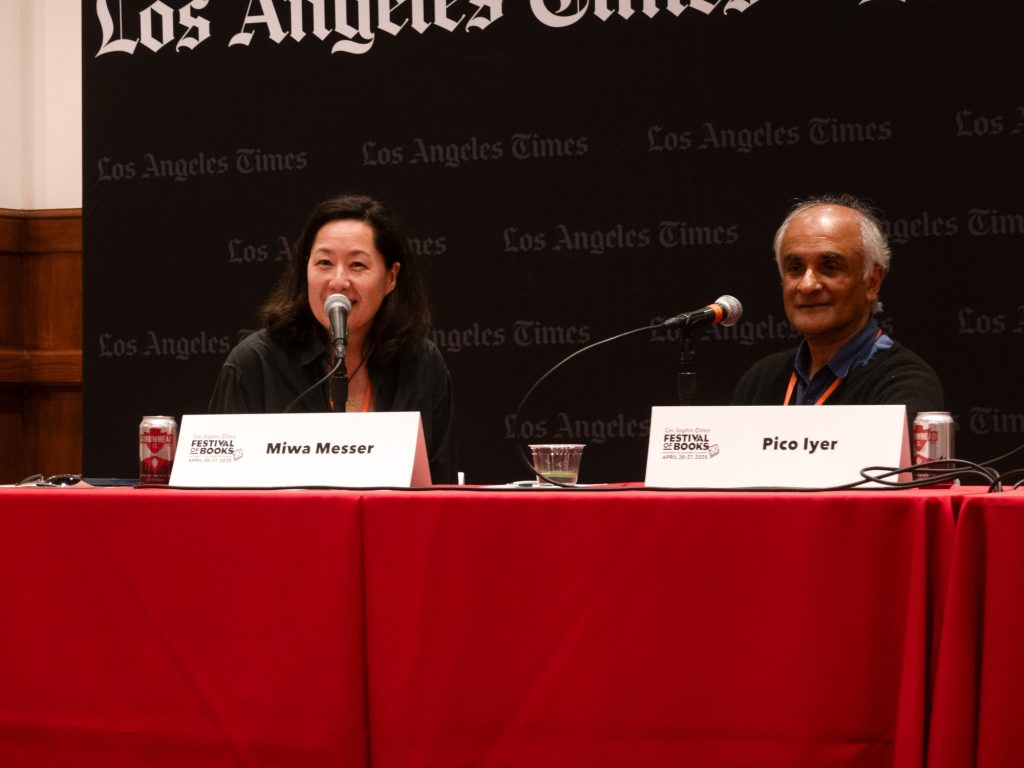
“I want to make sure you didn’t come to see Salman Rushdie.” Iyer, the eternally witty, well-travelled traveler took the stage at the Festival of the Books to slow things down and talk about his encounter with paradise. Lucky for us, this paradise was not tucked away on a Tibetan mountaintop nor in an Indian city of the dead, but only a little north of San Luis Obispo in an oceanside monastery.
Miwa Messer, host to “Poured Over: The Barnes & Noble Podcast,” welcomed Iyer home to California to talk about his newest book “Aflame: Learning from Silence.” Iyer’s new book comes as a sort of halt to his hectic lifestyle that shares his slow encounters that have given him space to recollect. Per Messer, “to be a truly global writer, you have to come home.” Global Iyer most certainly is: over the course of his career writing for Time, Harper’s and The New York Times, Iyer has traveled through war afflicted zones in Africa and the Middle East, dictatorships like North Korea and eccentric destinations like Easter Island. Yet California has become a kind of home to Iyer, a place that he has dreamed of living in since his days “growing up in a 15h century internment camp known as a boarding school” in Oxford.
“Six hours north,” Iyer told the crowd, “past SLO, Highway One narrows and opens to golden meadows and flat ocean.” Somewhere south of the town of Lucia, he turned right onto an “even narrower road where sits a Catholic monastery.” The “pulsing silence” of The Hermitage, the Catholic retreat that gives, per Pico, “a very different feeling from driving in 405 traffic,” sent Iyer into such a feeling of peace that he decided to write his story “Aflame” to investigate the power of silence in our chaotic lives. As a secular writer, he felt it fit to share that some 50% of the monastery guests did not belong to the Christian faith, and that the emphasis of The Hermitage (and, by extension, his book “Aflame”) falls entirely on the “liberation from the chatter,” the feeling that “the world is not erased here, [that it is] only brought back into its proper proportion.” Ever erudite, he claimed that this is the answer to T.S. Elliot’s lament, “Where is the life we have lost in living?”
Yet Iyer stressed that this is not the only possible paradise. Paradise may or may not be a place on earth, but through adopting an appreciation for silence, we can find paradise in nearly anything, in solitude and in community. He pointed to two of his literary heroes, Henry Thoreau and Emily Dickinson, who embodied the comfort with silence that Iyer hoped to express in his book. Thoreau, “the patron saint of hermits,” Iyer admired for his ability to “step outside his door to find how to be a better member of the community.” Dickinson, he admired for her ability to “sit in the middle of immensities,” contemplating only light and divinity. In his solitude, Iyer hopes to draw from all these competing elements to “rescue the reader from this distracting world … to write deliberately slow in the hope that you follow it to the end and that you can pick it up at any page and in any place and can find yourself fin quiet meadows rather than this world of skyscrapers.”
Rebecca Yarros, author of “Onyx Storm,” in conversation with Rachel Howzell Hall
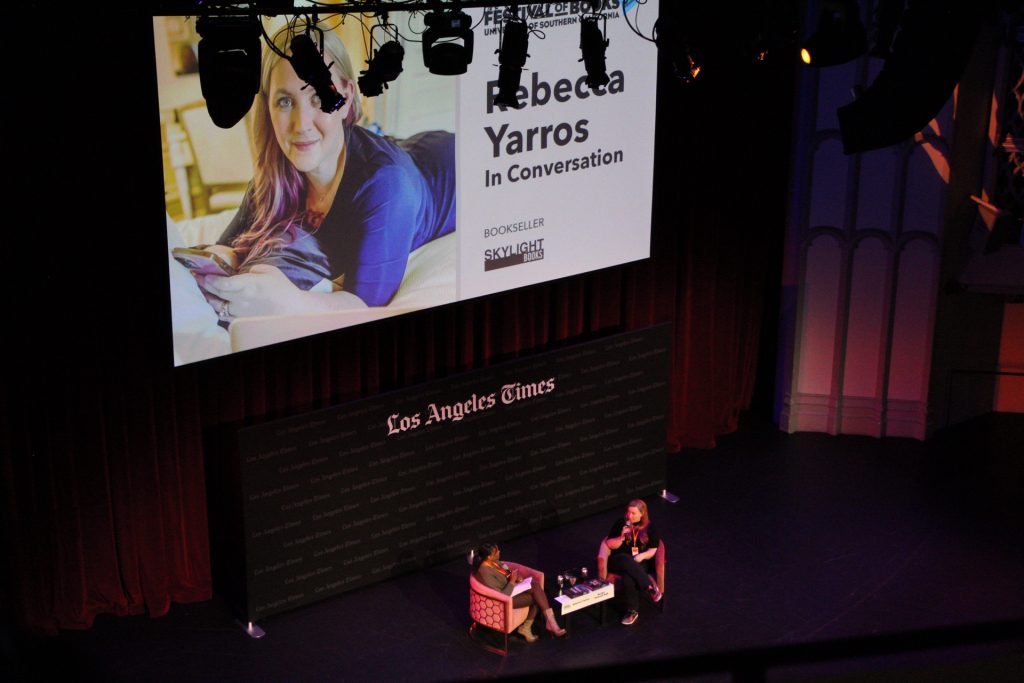
At the 2025 LA Festival of Book, one name stood amongst the rest – Rebecca Yarros. Countless fans lined up around the block and filled USC’s massive Bovard Auditorium to the brim to hear their favorite author discuss her creative process behind her high flying series – “Fourth Wing.” With the interview already commenced, the general admits straggled into their seats.
Rachel Howzell Hall, the master of ceremonies for this interview, broke into conversation with Yarros about how she gets into the creative process. The author said that she keeps a “bible” for each book so she has a reference for how characters have evolved throughout her acclaimed fantasy series.
Next, Hall inquired about a moment of inspiration that influenced Yarros’ writings to which her initial response was, “You guys haven’t seen it yet.” To provide a real answer, Yarros talked about when she was in Paris touring one of her books. Whilst writing “Onyx Storm” on a Parisian balcony, she began to wonder why all the buildings are the same height. She then proceeded into a historical deep dive as to the city’s architectural history and came away with new contributions for how to deepen the lore of her literary landscapes.
Since Yarros has gained a massive platform unbelievably fast, Hall asked how she deals with audience criticism. While the initial response was, “You are not a chocolate chip cookie,” to communicate how she cannot please everyone, she also admitted how backlash and poor reviews do still affect her. Conversely, Hall’s next question was about what makes Yarros happy. While the regrowth of her hydroponic garden has brought her immense joy, the writer said she loves nothing more than having her entire family home – jokingly adding how this way, she doesn’t have to worry about getting a call from the state trooper.
Despite Yarros being most widely known for her romantic outings, she also writes many contemporary works. This led Hall to ask if these opposing genres conflict or aid in the development of the other. The author said that writing contemporary books greatly helps inform her fantasy because, in the real world, a dragon won’t swoop in to save the day. Through her work in contemporary fiction, it reminds her to center her conflict around character motivations and flaws as to ground her series about dragon riders.
As the interview was nearing its own conclusion, the question veered towards how the “Fourth Wing” books are constructed and how it relates to the series’ meaning as a whole. Since the world of “Fourth Wing” has grown impressively large at an even more impressive rate, Yarros discussed the importance of using multiple perspectives to properly explore it all. While key story moments should always be told from the perspective of those who have the most to lose, the author said that Violet Sorrengail, “Fourth Wing’s” main characters, cannot be everywhere, so it was vital to use her vast number of supporting characters to reveal new elements in her world.
On the message behind her fictional narrative or dragons, Yarros remarked how it is a commentary and a battle against censorship. The “Fourth Wing” series explores the consequences of a world that erased its own history by only examining it from the victor’s point of view. Being a history major herself, Yarros notices the terrifying echoes of repeating history going on around the world today. It is because of her adamant distance that she partners with the PEN America foundation to protect free speech.
With this lasting and powerful message as to the importance of literature or all genres in mind, Yarros talked to her devoted audience and sent them off to read the world from every point of view.
Food Fight: Top Chef and the Reality Cooking Show Phenomenon
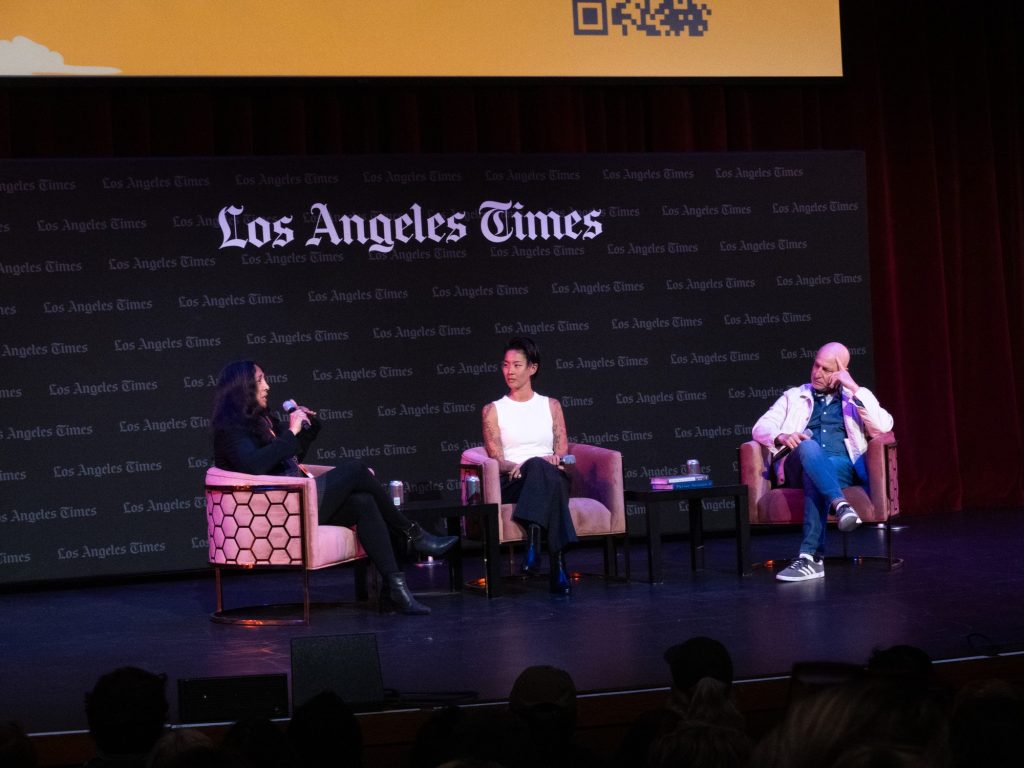
Bovard Auditorium was packed with what seemed like at least a good handful of Top Chef superfans anticipating the panel with Top Chef Season 10 winner and host Kristen Kish and longtime producer and judge Tom Colicchio. The panel dedicated time to the hit reality cooking competition show, Colicchio and Kish’s new books, and their personal stories of becoming a chef.
Colicchio ended up on the show after denying any participation several times, but the chef joked that eventually the sight of Bobby Flay signing over 300 books to his 15 pushed him to agree to appear on TV. It took a few seasons for the show to find its footing, going from casting home cooks and caterers to solely focusing on the culinary side of the show as opposed to the reality side.
Kish appeared on the show only after the relentless advocating from one of her mentors. Kish did not know how much her mentor helped her land a spot on the show, especially when she felt her resume was not up to par with the show’s expectations whatsoever. Although Kish was eliminated from the competition after a poor performance during the infamous restaurant wars, she was able to battle back in Last Chance Kitchen and secure the win. Kish was poignant with the negative reaction and jealousy within the restaurant she worked at after the win, leaving after less than a year to find a better environment.
Colicchio took this opportunity to give some advice for young chefs like Kish who have just begun their cooking career: “don’t be in such a rush.” Colicchio noted that the hard part of being a chef is not the dish, but the process of creating a kitchen where a chef can take their creation and plug it into a system that can execute it consistently. He encourages all chefs to spend time and stay at their restaurant after going on the show and not immediately jump into the fanfare of fame.
The creative journey of Colicchio’s book “Why I Cook” echoes his sentiment to take time, as it took him nearly 17 years to finally publish his memoir cookbook. It went through many stages—from being a recording of his Tuesday dinners, to teaching his son how to cook, to even a book about gardening. Eventually, after holding cooking classes on Zoom during the pandemic, Colicchio began to think about why he cooks. Noting his father and grandfather specifically, Colicchio settled on a memoir to showcase the stories that brought to where he is today, including how cooking saved him from drug addiction.
For Kish, her journey as a chef started with grasping for anything that made her feel confident. Cooking turned out to be something that made her feel good about herself and her abilities, leading her to culinary school and the chef she is today.
The Q&A session was unsurprisingly loaded with questions on the behind the scenes and structure of the show, ranging from accusations that the show purposely assigns plates with mistakes to important judges to inquiring Colicchio about how he makes his decisions on Last Chance Kitchen. The intersection between TV and cooking that the two occupy was most apparent in their witty and entertaining responses: when asked how Kish manages cooking on the go while traveling during her book tour, she promptly answered “I don’t.”
